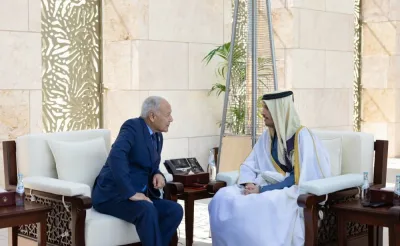Qatar “consistently” ranks among the top five markets in the Middle East and North Africa (Mena) region for American goods, according to a senior official of the National US-Arab Chamber of Commerce (NUSACC).
While Qatar is small both geographically and in terms of population, NUSACC president and CEO David Hamod said the country plays “an outsized role” when it comes to purchasing US exports.
“In my opinion, this is a reflection of Qatar’s desire to ‘Buy American’ because Qataris appreciate the quality and reliability for which US products are well-known. This is especially true in the countdown to the 2022 FIFA World Cup, where Qataris will want to showcase the best that their country has to offer,” Hamod told Gulf Times in an interview.
Hamod said historically, other major economic drivers include oil and gas, security, infrastructure, and retail. But in recent years, he noted that “the number one” US export to Qatar are Boeing commercial aircraft.
“To these, I would now add education and healthcare, as well as quality-of-life sectors that are increasingly important to the Qatari people. Coupled with entrepreneurship, these sectors highlight Qatar’s role as a regional leader in the transition from a hydrocarbon-based economy to a knowledge-based economy,” he said.
Hamod also lauded Qatar Airways for helping promote commercial activity between Qatar and the US, adding that “people underestimate” Qatar Airways’ role to promote commercial relations between the two nations.
“The airline is serving as a bridge, directly connecting 10 gateways in the US with Doha. This is generating thousands of jobs and many millions of dollars revolving around two-way tourism.
Similarly, Hamod said Qatar Airways is helping to overcome logistical and perceptual obstacles for investors.
“In the not-so-distant past, there were no direct flights between our two nations, so it was a challenge for investors to make those long, inefficient trips. Today, there are dozens of non-stop Qatar Airways flights between Doha and the US every week, making it easier than ever for investors to meet face-to-face to explore commercial opportunities.
“Keep in mind, of course, that Qatar Airways is not just about carrying passengers. The airline also carries freight (cargo), and this contributes significantly to the importing and exporting of goods and services between our two countries,” Hamod explained.
Asked about the impact of the economic blockade on Qatar-US trade, Hamod said the Gulf crisis has had “a negative impact” on the entire region.
“Approximately three-quarters of US exports to the Mena region go to the Gulf Cooperation Council (GCC) nations, so when this region becomes disrupted, it has a big impact on overall US-Mena commercial relations.
“In 2017, US exports to Qatar dropped, but Qatar was not alone – American goods exports to both Saudi Arabia and the UAE declined by 10% last year, creating an impression that turmoil in the GCC may be driving off American traders and investors,” he said.
Hamod added: “Looked at another way, the declines in those three countries alone translated into a loss of approximately 35,000 US-based jobs in 2017, which suggests that the current disruptions are a lose-lose situation for most everyone in the region.”




